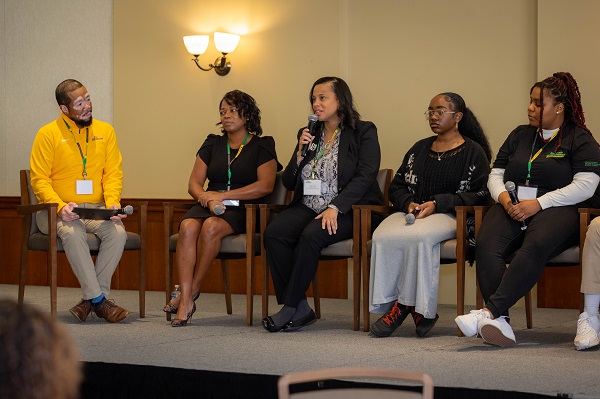At first-ever Amistad Conference, teachers, scholars, community leaders explore innovative ways of teaching Black history
At first-ever Amistad Conference, teachers, scholars, community leaders explore innovative ways of teaching Black history

Sixty educators, scholars, students and community members joined together to explore innovative ways to teach Black history in New Jersey’s schools during the first-ever Amistad Conference at Rowan University.
During a time of heightened need for greater understanding of the significance of teaching U.S. Black history, the day-long conference featured presentations and panel by educators, students and community leaders, as well as cultural performances celebrating Black culture.
The College of Humanities & Social Sciences and the College of Education presented the conference last month. Last year, through a $133,748 grant from the National Endowment for the Humanities, Chanelle Rose, a professor in the Department of History, and Valarie Lee, a professor in the Department of Critical Literacy, Technology and Multilingual Education, established the Black Humanities in Education Initiative Through History and Culture.
A multi-pronged curriculum to support the development and instruction of content knowledge in Black history for pre-service and in-service teachers in South Jersey schools, the initiative takes an interdisciplinary approach to teaching Black history that focuses on the intersection of philosophy, literature, politics and history.
Last summer, 20 educators registered for an eight-week, asynchronous professional development course entitled "Empowering Educators: Strategies for Integrating Black History Into the Classroom." This self-paced course allowed participants to learn new ways to teach African American history, discuss racially sensitive topics, and engage students.
The initiative supports the state’s 2002 Amistad Law, which called on K-12 schools to incorporate Black history into curricula throughout the year. In 2023, Gov. Phil Murphy strengthened that mandate.
The Amistad Conference brought together teachers who attended the course, students, teachers and administrators from Cherry Hill, Lawrenceville and Deptford school districts and community members dedicated to educating others about Black history.
Sen. Troy Singleton (D-7th), a Rowan alumnus, opened the conference.
“Today’s conference is impactful in a very critical way,” Singleton said, adding that Assemblyman Bill Payne created the state’s Amistad law. “It wasn’t easy to get this law passed. There are some who don’t want to talk about painful parts in African American history. Your engagement is critically important.”
Panel discussions covered a host of topics, including: the Cherry Hill school district’s graduation requirement for all students to take a Black history class; a presentation from teachers who completed the professional development summer seminar; a session on strengthening partnerships between higher education public schools and the community; and a session exploring the ways educators can approach teaching Black history in secondary schools.
Brandon Johnson, a senior at Cherry Hill West, said the Black history requirement positively impacted his school and his classmates.
“It made the school a lot more connected," Johnson said. "You always had a student asking a question they never would have asked before. I think uncomfortable conversations are needed.”
Gaëtane Jean-Marie, dean of the College of Education, offered keynote remarks.
“Among the 12 states that passed legislation to teach Black history in schools, New Jersey is leading the effort to implement this law effectively,” Jean-Marie said. “Contrary to this, since 2021, at least 18 states have imposed bans or restrictions on teaching topics of race and gender. There is something wrong with an educational system that negates educational equity for all.
“There is great value in P-12 schools both incorporating Black history across content areas in all grades, as well as dedicated coursework,” she continued. “When Black students see their own stories reflected in the books they read or the lessons they are learning, it stimulates their intellectual curiosity, freedom and discovery. If we want a better and just world, we need to deepen the knowledge of all learners.”
During the conference, performances celebrating Black culture were offered by Rowan alumni Moses Possible and Asia J. Todd.